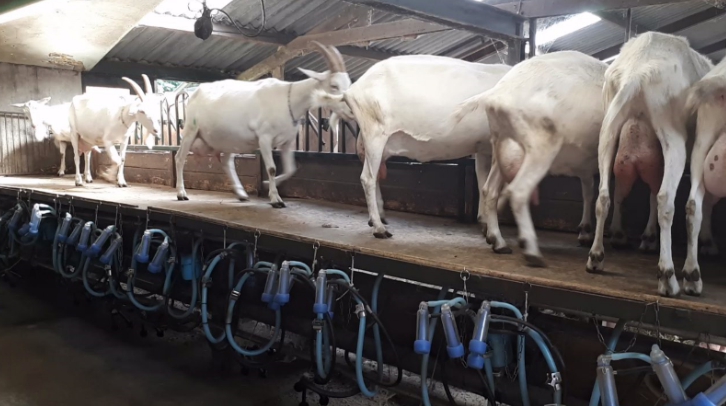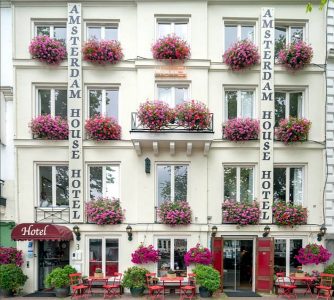Today a team of Eyes on Animals received a tour of the organic dairy goat farm / cheese producer De Groote Stroe in Stroe. We were welcomed by Harry and Magda. What’s special about De Groote Stroe is that the young goats are kept with their mother. The young ones can drink from their mother for a longer period of time, grow up in the herd and don’t receive powdered milk. They are weaned after three months
The goats are of the standard breed “Dutch white milk goat”. Because the young goats are not separated from their mothers, they build up a good immune system so that antibiotics are not needed: the focus is on strengthening the immune system instead of disease control. If the goats do get sick, they will be treated with special homeopathic remedies and herbs. The majority of the billy (male) goats are taken from their mother early and brought to a goat fattening farm nearby. A small number of them (15-20) is fattened on the farm itself until the age of slaughter. How to deal with these billy goats born is a big problem in goat farming. On average 50% of the young are male and are essentially redundant because the market for them is (too) small.

The animals stay outdoors for most part of the year and can choose to stay indoors or go outside. There is also a number of billy goats who live together permanently, in the meadow with shade.
The goats are milked twice a day. How this is done, was lovely to watch. Harry calls the ‘ladies’ together and then they willingly gather in the collection shed that leads to the milking installation. Via a ramp the goats walk up to the next level where the milking installation is located. After milking they walk down another ramp. It was very nice to see Harry let two goats walk upstairs first while the rest of the goats had to wait. One goat was very tame and the another one was lower in rank and did not like to be together with all the other goats in the assembly shed. Only after these goats were in the correct spot, Harry called the other goats upstairs, who joined in calmly. While they were eating, the animals were milked and then calmly walked down the ramp to make room for a new group.
We’ve had an interesting time at this farm. The way the goats are treated was very appealing to us.
Our visit was during the heat wave. Some of the goats were in the barn because it had food and shade. It was very hot in the barn and the goats were suffering from heat stress. Initially, we advised them to purchase large fans for the barn. By placing one or two fans, these goats can be offered some relief from the heat. Harry and Magda responded: “We prefer to offer the goats a choice. They can either go outside, lie in the shade under the trees, or go inside every now and then to eat some more hay. An investment in trees is therefore more sensible to us. This is what we did last spring. A fan uses electricity and resources, a tree traps CO2 and contributes more to the environment, biodiversity and a better climate. We don’t want to solve the problems with more technology, but through nature”. A response that we agree with as well.
For more information: http://degrootestroe.nl

